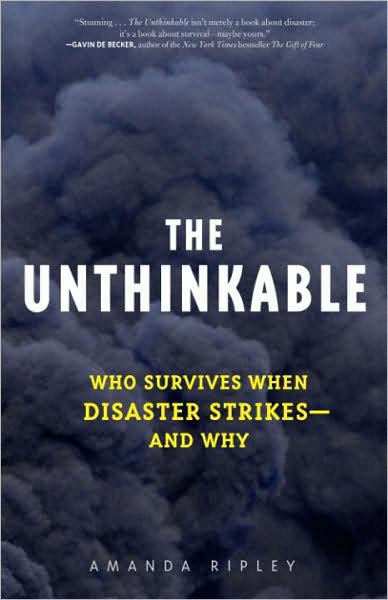
The Unthinkable
Who Survives When Disaster Strikes--and Why
کتاب های مرتبط
- اطلاعات
- نقد و بررسی
- دیدگاه کاربران
نقد و بررسی

April 14, 2008
Ripley, an award-winning writer on homeland security for Time
, offers a compelling look at instinct and disaster response as she explores the psychology of fear and how it can save or destroy us. Surprisingly, she reports, mass panic is rare, and an understanding of the dynamics of crowds can help prevent a stampede, while a well-trained crew can get passengers quickly but calmly off a crashed plane. Using interviews with survivors of hotel fires, hostage situations, plane crashes and, 9/11, Ripley takes readers through the three stages of reaction to calamity: disbelief, deliberation and action. The average person slows down, spending valuable minutes to gather belongings and check in with others. The human tendency to stay in groups can make evacuation take much longer than experts estimate. Official policy based on inaccurate assumptions can also put people in danger; even after 9/11, Ripley says, the requirement for evacuation drills on office buildings is inadequate. Ripley’s in-depth look at the psychology of disaster response, alongside survivors’ accounts, makes for gripping reading, sure to raise debate as well as our awareness of a life-and-death issue. 8 pages of color photos.

May 15, 2008
Ripley, a "Time" reporter who has covered Hurricane Katrina and other catastrophes and whose article "How To Get Out Alive" inspired this book, offers an elementary discussion of disaster and survival, drawing on both survivors' personal accounts and scientific studies that reveal how the human brain functions under duress. She shows how individuals and groups react when such disasters as shipwrecks, fires, terrorist attacks, and tsunamis occur, detailing the traits survivors demonstrate that help them respond effectively. Ripley identifies what she has found to be typical stages of emotional response that occur through the course of a disasterincluding denial, delay, risk, fear, panic, paralysis, and heroismand investigates their effects on individual responses to disaster. She also touches on why disaster, though it strikes developed and undeveloped nations alike, tends to have a higher death toll in underdeveloped nations. Offering tips on how we can boost our odds, her self-help approach to survival will attract readers. Recommended for public libraries.Candice Kail, Carnegie-Mellon Univ., Pittsburgh
Copyright 2008 Library Journal, LLC Used with permission.

























دیدگاه کاربران